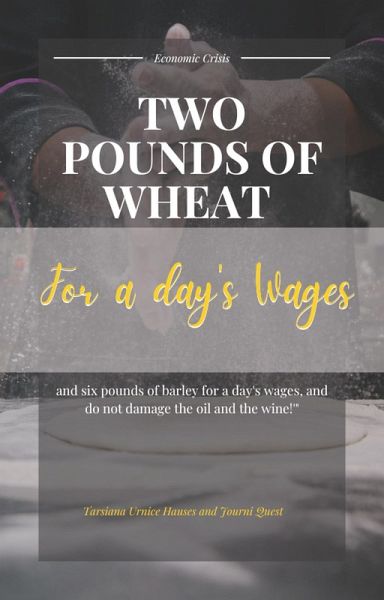
Two Pounds of Wheat for a Day's Wages (End Times, #23) (eBook, ePUB)

PAYBACK Punkte
0 °P sammeln!
Two Pounds of Wheat for a Day's WagesIn an era where economic instability seems ever-present, Two Pounds of Wheat for a Day's Wages offers a deeply insightful exploration of biblical wisdom in the face of financial uncertainty. Anchored in the evocative imagery of Revelation 6:6, this book provides a thorough examination of how ancient prophecies relate to contemporary economic challenges and what they reveal about the end times.Understanding Revelation 6:6Revelation 6:6 states, "Two Pounds of Wheat for a Day's Wages, and do not harm the oil and the wine." This verse vividly depicts a future t...
Two Pounds of Wheat for a Day's Wages
In an era where economic instability seems ever-present, Two Pounds of Wheat for a Day's Wages offers a deeply insightful exploration of biblical wisdom in the face of financial uncertainty. Anchored in the evocative imagery of Revelation 6:6, this book provides a thorough examination of how ancient prophecies relate to contemporary economic challenges and what they reveal about the end times.
Understanding Revelation 6:6
Revelation 6:6 states, "Two Pounds of Wheat for a Day's Wages, and do not harm the oil and the wine." This verse vividly depicts a future time of severe economic hardship where essentials are prohibitively expensive, while luxuries remain relatively untouched. By dissecting this powerful scripture, the authors illuminate its symbolic meaning and connect it to both historical and modern economic systems, offering a lens through which to understand current and forthcoming financial realities.
Historical Context and Biblical Economics
To grasp the full significance of this prophecy, Two Pounds of Wheat for a Day's Wages delves into the economic practices of ancient times. The book explores the value of labor, and the symbolic roles of wheat, oil, and wine. This historical perspective enriches the reader's understanding of the scripture, bridging the gap between ancient practices and today's financial issues. By comparing past and present economic conditions, the authors provide valuable insights into how ancient wisdom applies to contemporary financial crises.
Biblical Principles of Stewardship
At the heart of the book is a discussion on biblical financial principles that guide Christians in managing their resources:
Stewardship: The Parable of the Talents (Matthew 25:14-30) illustrates the importance of wisely managing resources and using them to advance God's kingdom.
Generosity: The story of the widow's mite (Mark 12:41-44) highlights that true generosity is measured not by the amount given but by the heart's willingness to give, even in scarcity.
Contentment: Philippians 4:11-13 encourages finding peace and satisfaction in God's provision, regardless of financial status.
These principles offer a solid foundation for navigating financial crises with faith and integrity, emphasizing responsible management and heartfelt generosity.
Faithful Narratives of Provision
The book also draws on biblical stories that exemplify God's provision during times of financial hardship:
Joseph's Preparation for Famine (Genesis 41) provides a model for strategic planning and foresight.
Elijah and the Widow at Zarephath (1 Kings 17:8-16) demonstrates God's miraculous provision in times of need.
The Feeding of the 5,000 (John 6:1-14) shows that God can provide abundantly even from limited resources.
These narratives serve as inspiration for readers, encouraging trust in God's provision and steadfastness through personal financial challenges.
Embracing God's Promises
Two Pounds of Wheat for a Day's Wages underscores the importance of holding fast to God's promises during financial trials:
Provision: Matthew 6:25-34 reassures that God will meet our needs as we seek His kingdom first.
Peace: Philippians 4:6-7 promises that God's peace will guard our hearts and minds in times of financial stress.
Strength: Isaiah 41:10 and Ephesians 6:10 remind us of God's strength in times of crisis.
Maintaining an eternal perspective by focusing on treasures in heaven (Matthew 6:19-21) and finding hope in Christ's return (1 Thessalonians 4:13-18) helps to align our priorities with eternal values.
In an era where economic instability seems ever-present, Two Pounds of Wheat for a Day's Wages offers a deeply insightful exploration of biblical wisdom in the face of financial uncertainty. Anchored in the evocative imagery of Revelation 6:6, this book provides a thorough examination of how ancient prophecies relate to contemporary economic challenges and what they reveal about the end times.
Understanding Revelation 6:6
Revelation 6:6 states, "Two Pounds of Wheat for a Day's Wages, and do not harm the oil and the wine." This verse vividly depicts a future time of severe economic hardship where essentials are prohibitively expensive, while luxuries remain relatively untouched. By dissecting this powerful scripture, the authors illuminate its symbolic meaning and connect it to both historical and modern economic systems, offering a lens through which to understand current and forthcoming financial realities.
Historical Context and Biblical Economics
To grasp the full significance of this prophecy, Two Pounds of Wheat for a Day's Wages delves into the economic practices of ancient times. The book explores the value of labor, and the symbolic roles of wheat, oil, and wine. This historical perspective enriches the reader's understanding of the scripture, bridging the gap between ancient practices and today's financial issues. By comparing past and present economic conditions, the authors provide valuable insights into how ancient wisdom applies to contemporary financial crises.
Biblical Principles of Stewardship
At the heart of the book is a discussion on biblical financial principles that guide Christians in managing their resources:
Stewardship: The Parable of the Talents (Matthew 25:14-30) illustrates the importance of wisely managing resources and using them to advance God's kingdom.
Generosity: The story of the widow's mite (Mark 12:41-44) highlights that true generosity is measured not by the amount given but by the heart's willingness to give, even in scarcity.
Contentment: Philippians 4:11-13 encourages finding peace and satisfaction in God's provision, regardless of financial status.
These principles offer a solid foundation for navigating financial crises with faith and integrity, emphasizing responsible management and heartfelt generosity.
Faithful Narratives of Provision
The book also draws on biblical stories that exemplify God's provision during times of financial hardship:
Joseph's Preparation for Famine (Genesis 41) provides a model for strategic planning and foresight.
Elijah and the Widow at Zarephath (1 Kings 17:8-16) demonstrates God's miraculous provision in times of need.
The Feeding of the 5,000 (John 6:1-14) shows that God can provide abundantly even from limited resources.
These narratives serve as inspiration for readers, encouraging trust in God's provision and steadfastness through personal financial challenges.
Embracing God's Promises
Two Pounds of Wheat for a Day's Wages underscores the importance of holding fast to God's promises during financial trials:
Provision: Matthew 6:25-34 reassures that God will meet our needs as we seek His kingdom first.
Peace: Philippians 4:6-7 promises that God's peace will guard our hearts and minds in times of financial stress.
Strength: Isaiah 41:10 and Ephesians 6:10 remind us of God's strength in times of crisis.
Maintaining an eternal perspective by focusing on treasures in heaven (Matthew 6:19-21) and finding hope in Christ's return (1 Thessalonians 4:13-18) helps to align our priorities with eternal values.
Dieser Download kann aus rechtlichen Gründen nur mit Rechnungsadresse in A, B, CY, CZ, D, DK, EW, E, FIN, F, GR, H, IRL, I, LT, L, LR, M, NL, PL, P, R, S, SLO, SK ausgeliefert werden.













